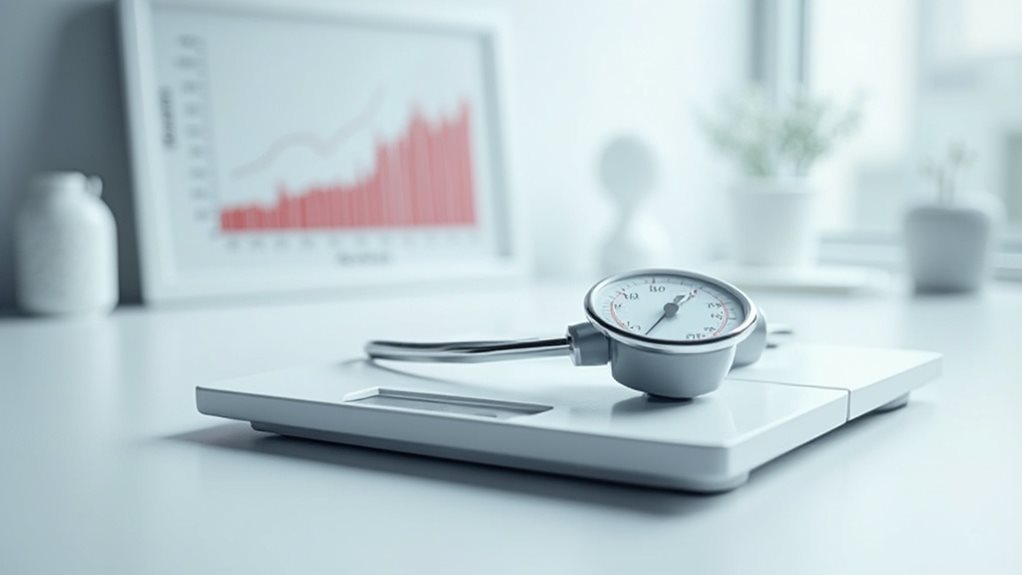
Your weight greatly impacts your blood pressure and managing it can reduce your risk of hypertension. As you gain weight, your blood pressure is likely to increase, heightening your risk for cardiovascular diseases. Adhering to a diet rich in fruits, vegetables, and whole grains, while engaging in regular physical and mind-body activities, can help manage both your weight and blood pressure. Monitoring your progress using tools like a home blood pressure monitor aids in keeping track of your health outlook.
Key Takeaways
- Excess weight increases blood pressure, elevating the risk of cardiovascular diseases.
- Obesity contributes to metabolic syndrome, which includes hypertension among other health issues.
- Reducing weight through diet and exercise can significantly lower blood pressure.
- Regular monitoring of weight and blood pressure helps manage and prevent hypertension.
- Implementing mind-body practices can aid in stress reduction, further decreasing blood pressure.
Understanding the Link Between Obesity and Hypertension
Understanding the link between obesity and hypertension is vital, as excess weight often leads to elevated blood pressure, a major risk factor for cardiovascular diseases.
You mightn't realize, but obesity isn't just about excess fat; it's a complex condition involving metabolic syndrome, which includes hypertension, high blood sugar, and abnormal cholesterol levels. This syndrome elevates your risk considerably.
Furthermore, obesity stigma can deter you from seeking necessary help, worsening your health outcomes.
It's essential to address both the physiological and psychological aspects to effectively manage and prevent hypertension. Acknowledging and overcoming these challenges is your first step towards better health.
The Role of Diet in Managing Weight and Blood Pressure
Building on the relationship between obesity and hypertension, we now explore how dietary choices notably influence both weight management and blood pressure levels.
Implementing dietary changes through strategic meal planning can greatly lower your risk. Opt for a diet rich in fruits, vegetables, whole grains, and lean proteins, which are known to reduce blood pressure.
Limiting sodium intake and processed foods is vital. By planning your meals, you guarantee balanced, nutritious intake without the excesses that contribute to weight gain and elevated blood pressure.
Effective Exercise Strategies for Reducing Hypertension

While adjusting your diet is crucial for managing hypertension, incorporating regular physical activity is equally necessary in reducing high blood pressure.
Here are some effective exercise strategies:
- Cardio Workouts: Engage in at least 150 minutes of moderate-intensity or 75 minutes of high-intensity cardio weekly.
- Strength Training: Include muscle-strengthening activities on two or more days a week.
- Consistency: Maintain a regular exercise schedule to guarantee sustained blood pressure reduction.
- Progressive Intensity: Gradually increase the intensity of your workouts to safely amplify health benefits.
These strategies, backed by research, help lower blood pressure and enhance your overall cardiovascular health.
Integrating Mind-Body Practices to Enhance Health
In addition to the significant benefits of regular physical activity for managing hypertension, integrating mind-body practices like yoga and Tai Chi can further enhance your overall health.
Mindfulness meditation, a core component of these disciplines, has been shown to aid in stress reduction, thereby lowering blood pressure. Studies indicate that regular mindfulness practice can decrease the stress hormone cortisol, which is linked to hypertension.
Monitoring Progress: Tools and Techniques for Tracking Blood Pressure and Weight Reduction
To effectively manage your health, it's vital to regularly monitor both your blood pressure and weight.
Employing the right measurement tools is important for accurate progress tracking. Here's how you can keep tabs:
- Digital Scales: Use a reliable digital scale for daily weight checks.
- Blood Pressure Monitor: Invest in a home blood pressure monitor with memory function.
- Health Apps: Track your readings and trends using health apps.
- Regular Check-ups: Schedule routine medical check-ups to review your data.
These tools empower you to make informed decisions, helping you adjust your lifestyle for ideal health outcomes.
Frequently Asked Questions
How Does Sleep Quality Affect Blood Pressure and Weight?
You'll find that poor sleep quality, particularly sleep deprivation, elevates your blood pressure and can lead to weight gain. Conversely, restorative sleep helps stabilize these levels, promoting overall healthier body functions.
Can Genetics Influence My Weight's Impact on Blood Pressure?
Genetic predisposition and environmental factors can influence how your weight affects various health aspects, though not directly specifying blood pressure. Understanding these connections helps tailor prevention and management strategies effectively for you.
What Role Do Stress Levels Play in Hypertension and Obesity?
Stress markedly spikes your susceptibility to hypertension and obesity. Effective stress management can curb these conditions. Integrating relaxation routines and regular exercise aids in obesity reduction and promotes profound physiological peace.
Are There Specific Medications That Worsen Weight-Related Blood Pressure Issues?
Certain medications can worsen weight-related health issues. For example, beta-blockers and corticosteroids may contribute to weight gain, complicating your efforts at weight loss and potentially affecting your overall health management strategy.
How Does Altitude Affect Blood Pressure and Weight Management?
At higher altitudes, your body must adapt, potentially causing temporary weight fluctuations. This adaptation can elevate your blood pressure as your body works harder to oxygenate your blood efficiently in thinner air.
Conclusion
Isn't it ironic that the weight you carry can weigh down your health? Yet, shedding a few pounds could lift both your spirits and your health metrics. By integrating healthier eating habits, consistent exercise, and calming mind-body practices, you're not just lightening the scale but potentially slashing your blood pressure too. Keep track of your progress with reliable tools—it's not just about losing weight, it's about gaining years, energy, and a heart that keeps beating strong.



